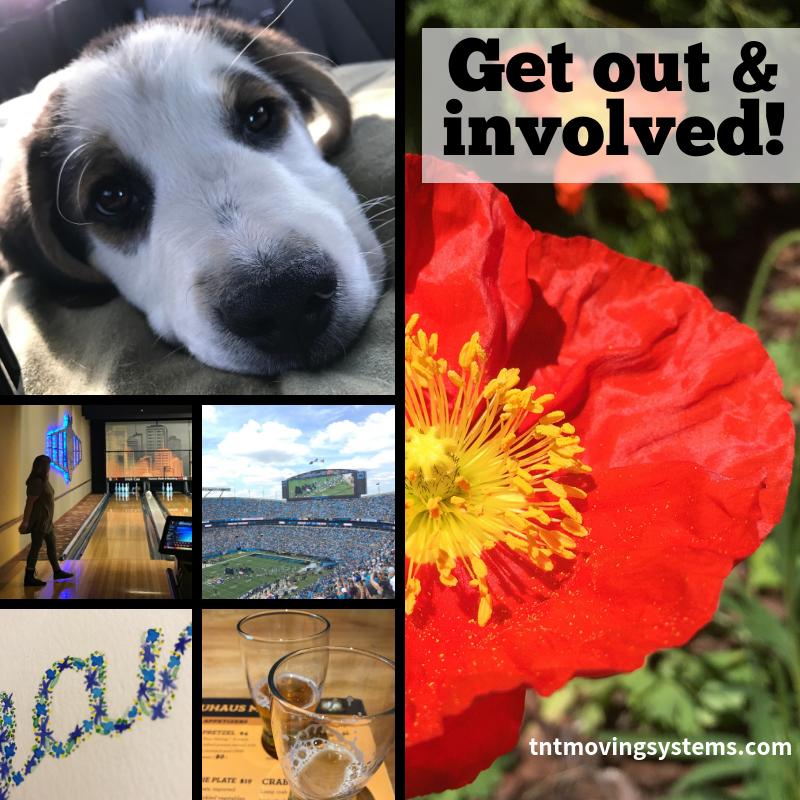Friday, December 28, 2018
Why Do Americans Move? The Top 6 Reasons Regarding Housing
Sunday, December 23, 2018
Thursday, December 20, 2018
Monday, December 17, 2018
How to Get to Know People (As an Adult) in a New Town
Relocating, at any age, is a stressful time in one’s life. Whether you are moving across town, across the country, or across the pond, change is difficult. While children have a hard time with moves too, they at least get the opportunity to make new friends at school, in the neighborhood and in after-school activities. That takes care of the young, but what about the “young at heart?”
Move.org reports that roughly 35.5 million (or 11 percent) Americans moved in 2017 (July 6, 2018), so you are far from alone in your quest to meet new friends and settle into a new community. The top five reasons to move are as follows: to relocate to a new or better home (16 percent), to establish their own household (11.5 percent), for “other” family reasons (11.3 percent), for a new job or job transfer (9.9 percent), and to find cheaper housing (8.3 percent).
The logistics of moving are tricky enough, but there can be emotional struggles along the way. Anxiety and depression are common. Psychologists* recommend three first steps to help you feel better and adjust, 1) get out of the house, 2) accept and extend social invitations, and, 3) do the things that made you happy in your old place.
Making friends as a grown-up offers some unique challenges, but it’s not impossible. Taking the above recommendations a step further, here are some tips to make meeting people and trying new things a bit easier:
GET OUT OF THE HOUSE
Do you have a hobby? Want one?Taking a class is a great way to meet new people in your community and it doesn’t have to be expensive. Local colleges and school districts have community education classes (time to brush up on your French or figural drawing?) and libraries have lots of opportunities for learning with classes and programs featuring locals who can inform you about places to visit in your new community. Over 50? You likely have even more options to meet people. Senior centers, universities, and AARP offer an array of classes for varied interests.
Raise a glass! With the popularity of micro-breweries and wineries, the traditional “bar scene” is shifting. Check in advance for special release evenings, tastings, and concerts at your local vineyard or taproom. You can mingle in a relaxing environment and grab a couple of bottles to stock your new kitchen.
Patronize me, please! Do you love art? Museums? Baseball? Consider becoming a patron at a local museum or buy season tickets to a sports team. You’ll be supporting local institutions and meeting like minded people. Museums have programs including lectures, films, gallery talks, and member only events. A great chance to share your love of Monet! Buying season tickets to a favorite sport will give you a season’s worth of plans, and your seat mates will be able to offer up tips on the best players and the cheapest beer and hotdogs.
Put yourself out there — outside that is! Is running, hiking or sunrise yoga your thing? Look online for groups in your area to join. Local stores can help you make connections while you shop for a new yoga mat or that perfect jogging hat. Many parks have programs (often free) and guided hikes. You’ll get your exercise, meet new people, and discover nature in your own back yard.
Volunteer! Do you love dogs, cats, hamsters, parrots, rabbits, horses, and more? Animal shelters often need volunteers of all sorts. From cleaning up, to fundraising, to helping with adoptions, to fostering, the needs are great. Smaller communities often have historical societies or houses that could use a hand on weekends or perhaps you are a wizard of the web and can lend your talents to their social media. Hospitals, political organizations, schools, the performing arts and social organizations have a wide variety of volunteer needs. Soon, you’ll be helping to not only fill your planner, but you’ll be filling your heart and your friends list in no time!
GET SOCIAL
Did you move for a new job? Perhaps your Human Resources representative can provide some contact information about groups who specialize in your field of work. It may serve two purposes: it will give you a chance to network andmeet people with similar interests. You might also find that some companies have a mentoring program and/or a new colleague may be willing to show you around town and introduce you to others.
L ooking for a job? Moving to a new area provides new opportunities to network. Look online for meetup groups, update your Linkedin and any applicable social media platforms to indicate your new city and highlight your skill set. Check out temporary opportunities, part-time and seasonal employment while you look for your new position.
ooking for a job? Moving to a new area provides new opportunities to network. Look online for meetup groups, update your Linkedin and any applicable social media platforms to indicate your new city and highlight your skill set. Check out temporary opportunities, part-time and seasonal employment while you look for your new position.
 ooking for a job? Moving to a new area provides new opportunities to network. Look online for meetup groups, update your Linkedin and any applicable social media platforms to indicate your new city and highlight your skill set. Check out temporary opportunities, part-time and seasonal employment while you look for your new position.
ooking for a job? Moving to a new area provides new opportunities to network. Look online for meetup groups, update your Linkedin and any applicable social media platforms to indicate your new city and highlight your skill set. Check out temporary opportunities, part-time and seasonal employment while you look for your new position.
Throw a party! Invite your new neighbors for a drop by meet and greet. Maybe you don’t want strangers in your house, does your community have a pool or a club house? Perhaps there is a homeowners meeting or social event coming up.
Get schooled. If you have a child in school (or are in school yourself), coordinate study groups in your home (church groups too), invite your children’s classmates over for supervised playdates, or volunteer for your school or church.
Do you have a secret talent? Maybe you are a pet sitter, great with gardens, or are handy with a hammer. Check local regulations first and offer your services to your neighbors. This will open the conversation and perhaps help your fill your wallet.
DO WHAT YOU LOVE
Make your favorite comfort foods. Maybe you are from an area known for chili and you are suddenly in chowder territory. Make yourself a pot (and perhaps invite a new friend to share). The holidays also offer up a great chance to make your traditional treats and introduce them to others.
Continue your hobbies. Before the move, do some internet searching and find out where you can practice Thai chi, skeet shoot, or horseback ride near your new digs. Or, maybe actual digging is what you dig! Those amateur archaeologist skills could prove a handy way to volunteer and help introduce you to those who came before.
Did you enjoy decorating? You have a blank canvas and the perfect opportunity to create your new nest. Check out the local antiques and boutiques and combine regional items with those you brought along with you.
Are you a reader? Join a book club or maybe even start one in your neighborhood at home. You could use this opportunity to trade some books or try out local authors.
Invite friends and family to visit! Spending time with loved ones can go a long way in helping you feel confident in your new environment and it lends the opportunity to be a tourist and play tour guide in your new city. Invite new friends or co-workers to join in and explore together!
While moving as an adult and making new friends does have challenges, it can also open you up to experiences and friendships you may never have imagined!
*Martijn Hendriks, Kai Ludwigs, and Ruut Veenhoven, “Why are Locals Happier than Internal Migrants? The Role of Daily Life,” Social Indicators Research 125 (2016): 481–508.
Monday, December 3, 2018
How To Keep Your Home and Belongings Safe During a Move
Moving can be a strangely public process. Between cleaning out the closets and hauling things off to donate, leaving items out at the curb for pickup, and loading up the truck, all your possessions — and the fact that you’re in transition — is on display for all the world to see.
There are all kinds of scenarios that may present a security risk. Perhaps you find yourself stretched between two homes with some belongings in each or completely moved in to your new home with an unoccupied and unsold home left behind. How do you handle the risk of a possible break-in or theft?
TNT Moving Systems has learned a lot about home security over the years. Here we pass on some tips to keep you and your possessions safe.
Basic Safety
Inevitably, when you move from one place to another, there end up being periods of time when you are not physically present at the house, which heightens the chance of burglary, but it doesn’t mean you can’t be prepared. Here are five basic things you can do right away to your home to keep it safe and secure:

- When you leave, make sure all your windows and doors are locked. Sure, this seems obvious, but you would be surprised at how often doors and windows are left unsecured! This is why most forced entries are initiated from these points. With new homes it is common to open windows to see how they work, to air-out the new place, or even just to feel the breeze, and then to completely forget to latch the lock back. The same goes with doors. With the rush of moving boxes in and out, a simple task like locking the door can be forgotten. It’s always best to double-check all windows and doors.
- Keep the yard up. This goes for the new and the old place, if it hasn’t been sold yet. Once a yard starts to get out of hand, and not a lot of foot traffic is evident, it is clear the house is vacant. Try and keep up the appearance of normal life taking place at both homes. This will keep those wandering eyes away.
- Get yourself some motion detector lights. These are highly effective because they provide immediate reaction. Make sure all entry points are covered including any obfuscated from view like basement doors or windows behind shrubs. Nothing makes a burglar scatter like a bright light!
- Keep valuables close. Small items like jewelry or family heirlooms are good to keep with you. For those larger items like a big screen tv, bikes, the family silver, or a gun cabinet, consider a safe or public storage. Even leaving such things with a trusted friend or family member is better than leaving them in an unoccupied home.
- Park a car in the driveway. If you have an extra car, leave it parked in the drive as often as possible. If you need your car(s), ask a neighbor to park in your drive. Any activity that makes it look like someone is at the house is best. Of course, don’t forget to lock the car doors!
- Stop the mail. Cancel the newspaper delivery, get your forwarding order in with the postal service, and make sure there aren’t any packages on their way that may sit unattended for days.
Smart Homes
These days it’s easier than ever to include smart technology in your safety plan. We have gone through tons of smart locks and indoor cameras and narrowed the competition. Here are three entry-level smart devices you may want to consider:
- Kwikset Kevo Smart Lock 2nd Generation. This smart lock with a Bluetooth-enabled deadbolt alerts you anytime someone tampers with the lock and provides an immediate notification for anyone entering the code or simply messing with the door handle. It only costs $175.
- Logitech Circle 2 Indoor Camera. Due to recent price drops on indoor cameras, more and more people are having them installed. An indoor camera may not necessarily keep intruders at bay, but it will record any action and thus have evidence to provide to police. The Logitech is a Wi-Fi camera that allows you to see any and all activity happening inside your house no matter where you are.
- Smartphones. Currently, there are plenty of systems such as, Scout, Apple Homekit, and Eve that sync smart devices together to create systems for self-monitoring.
Home Security
When it comes to choosing a full-blown home security system, it’s easy to get stuck between spending more than you really need and not getting the level of security you want. Here’s what you need to know about home security systems:
- It never hurts to do a quick online search for reviews of local home security system providers. Chances are, you will end up looking at ADT or CPI, but there are other options out there worth considering.
- Once you have a few companies in mind, ask for their security packages and price points (you should not be paying anything over $30 to $50 a month). Compare and contrast. Each company should give you a complete overview of their capabilities, installation costs, and monthly fees.
- Talk to others about their security systems. Different people have different needs. Are you a family of one who needs to let the dog walker in from time to time or a family of six managing ever-changing schedules? Talk to people like you to learn what they like and dislike about a company or product.
Beyond break-ins, the next big scare tends to be home fires. Though preventable, house fires cause a lot of heartache.
One easy, and very important, way to keep you and your family safe in case of a fire is to have an old-fashioned fire extinguisher around. Though they may seem to be a device of the past, they are not. An extinguisher is the best, quickest, and least expensive way to stop a small fire from spreading. We suggest the First Alert Pro5. It exceeds the minimum law compliance for business and some residential establishments and is effective against the most common household fires: wood, paper, fabric, flammable liquid, and live electrical equipment fires.
A fire extinguisher only works though if you know how to use it and you know there’s a fire. Read the label on your extinguisher so you can operate it at a moment’s notice. And make sure that you have working smoke alarms. There are ionization alarms that quickly detect fast-moving fires and photoelectric smoke alarms that are quicker to sense a slower, smoky fire such as an electrical one that starts within the walls. It is recommended to have both kinds of alarms or a dual sensor alarm. Also consider whether your alarm system needs to address special circumstances such as hearing impairment or blindness.
Speaking of fires, do you know that a fire extinguisher is NOT the right tool for a grease fire? Only specialized fire extinguishers can be used on grease fires, as hot grease burns at an extremely high temperature and is in a liquid form that can easily spread from surface to surface.
- Consider your safety first — grease fires can easily result in burns to the face, arms, and chest. Protect yourself and cover the flames with a metal lid or cookie sheet. Turn off the heat source. If the fire is small, use salt or baking soda to cover the flames.
- Never use water, flour, baking powder, sugar, or a wet towel all of which can spread or feed the fire.
- If your attempt to put out the fire fails, leave immediately and call 911.
At TNT Moving Systems, we want you to be safe during and after your big move. The most important thing to do is stay aware and make smart decisions about your home’s safety.
Subscribe to:
Comments (Atom)





